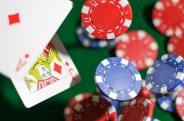
Smarter Bet Guide to Blackjack
The Math Behind Chance: Breaking Down Popular Luck-Based Games
When you hear the term games of luck, the first thing that comes to mind is that they are random and that no one knows if and when they are going to win. In fact, these games and their predictability There are occasions when we here at ReadyBetGo want to bring you interesting facts about the gambling industry When something catches our eye, we will publish it for your enjoyment.
There are occasions when we here at ReadyBetGo want to bring you interesting facts about the gambling industry When something catches our eye, we will publish it for your enjoyment. 
are based on math, and often very complex and interesting math.
In this article, we’ll go over some of the math concepts behind some of the games of luck offered by the best Solana casinos and explain how they operate on a mathematical level. These casinos use Solana as a payment method, providing a safe and reliable way to make wagers for players all over the world. For most games, the odds of winning are so astronomical that they still count as luck for most players.
The Basics of Probability
Probability is the foundation of all games of luck. Simply put, it measures the likelihood of a favorable outcome. The formula is:
Probability = (Number of favorable outcomes) ÷ (Total possible outcomes).
Let’s take the simplest example of coin flips: there are two possible outcomes, heads or tails. Each flip has one positive outcome, the one you chose, and therefore the probability is one in two, or 50 percent.
For a more complex example, rolling a six-sided dice has a one in six chance of rolling any particular number.
Another important concept to have in mind is expected value. It measures what a player can expect to win or lose on average over many trials. For most games, the expected value is negative, meaning the players will most likely lose.
The Big Numbers Game
The big numbers game relies on the concept of combinatorics. It’s the math of counting all the possible combinations. For instance, if you play the lottery and choose a six-number combination from 49 numbers available, there are 13,983,816 combinations to choose from.
With one ticket, the chance of winning the lottery is one in almost 14 million, meaning that there’s more of a chance you’ll be hit by lightning.
The Oldest Probability Game
One of the oldest games that relies on probability is a dice game in which the player guesses the result of a dice roll. Games such as these have existed since ancient times, with rules and numbers changing, but the basic principle remaining the same.
The chance of rolling any number on a six-sided dice is one in six, but things get interesting when you roll more than one dice at a time. The more dice you roll, the more the outcomes follow a bell-shaped curve. That’s why rolling sixes on all six dice is so rare, and middle results are more common.
How an Edge Works
An edge refers to the advantage that the house has in a betting game of luck. Chances are always against the player. This is easily noticeable in roulette. A European roulette wheel has 37 slots (numbers 1–36 plus a single zero). If you bet on one number, the probability of winning is 1/37, or 2.7%. A payoff to such a wager is 1 to 35.
The expected value is negative because the true odds (1/37) don’t match the payout odds (1/35). This gap represents the edge in favor of the roulette.
Probability and Combinatorics
Card games are a good example of how combinatorics and probability meet and interact. There’s a limited number of cards, but the way a player combines them provides almost unlimited combinations and therefore a difference in odds.
For instance, in a game of poker:
- The chance of being dealt a royal flush (A-K-Q-J-10 of the same suit) is 1 in 649,740.
- A full house appears about once in 694 hands.
- A simple pair, however, is dealt about 42% of the time.
The odds are calculated by dividing the number of favorable hands by the possible hands one can have with five cards, which is 2,598,960.
Random Number Generators and Return to Investment Rates
Random number generators do exactly what the name suggests and generate numbers on which the outcome of some games is based. The most popular of these games is slots. However, the name is a bit of a misnomer as the numbers aren’t completely random. For example, a jackpot symbol might have a probability of 1/100 per reel. Lining up three jackpot symbols would then have a probability of 1/100 × 1/100 × 1/100 = 1 in 1,000,000.
A player of slot games should also be aware of other statistics and the return-to-player rate. It refers to the percentage of funds a player has put in that they get back. For instance, if the rate is 96 percent, it means the player will get $96 back for every $100 they put in.
Probability Distribution
Not all probabilities are as simple as a coin flip. For a more complex example, it’s important to understand the probability distribution, which refers to how outcomes are spread out across all possibilities.
Let’s take a pair of dice as an example. The chance of rolling a total of 2 (only one outcome: 1+1) is 1/36, or about 2.8%. But the chance of rolling a total of 7 is much higher because six different combinations equal 7 (1+6, 2+5, 3+4, 4+3, 5+2, 6+1). That means 6 out of 36 possible outcomes, or 16.7%. These probabilities happen at a curve, with some sums being more likely to come up than others.
The Central Limit Theorem
The central limit theorem refers to another important idea related to probability. It states that if you repeat the game a certain number of times, the results will form a normal distribution, which is a bell curve with an average in the center.
For instance, with a roulette wheel, the probability of winning a wager set on red is 18/37 or 48.7 percent. If you make 1,000 such wagers in a row, the results will cluster around an average, meaning you’ll lose about $27 if each wager is made for $1.
Illusion of Streaks
One important thing about probability that everyone playing games of chance should keep in mind is that streaks are an illusion. Certain outcomes will occur several times in a row according to the probabilities we mentioned, and the players mistakenly believe that their streak will continue.
An opposite reaction is often common; those who play games of luck believe that they deserve a win after a few losses in a row. This is an understandable belief, but it isn’t based on math and probability, and therefore, it should be discarded by serious players.
To Sum Up
Games of luck are called that, but they are not based on luck, but on measurable probability. The players who engage in these games should be aware of those principles, but even if they do, they can’t affect them. Some of these are very simple, such as probability, but as the games get more complex, so do the principles.
It’s also useful to be aware of these rules to avoid mistakenly waiting for a streak to continue or to stop. The games work based on probability, and players don’t deserve an outcome, nor does an outcome punish them.
